Entrepreneurship & Small Business Management: Ventures and Traits
VerifiedAdded on 2020/06/06
|16
|4684
|41
Report
AI Summary
This report provides a detailed overview of entrepreneurship and small business management, focusing on different types of entrepreneurial ventures and their relation to the typology of entrepreneurship, highlighting the similarities and differences among various entrepreneur types. It explores the ...

ENTREPRENEURSHIP
AND
SMALL BUSINESS
MANAGEMENT
AND
SMALL BUSINESS
MANAGEMENT
Paraphrase This Document
Need a fresh take? Get an instant paraphrase of this document with our AI Paraphraser
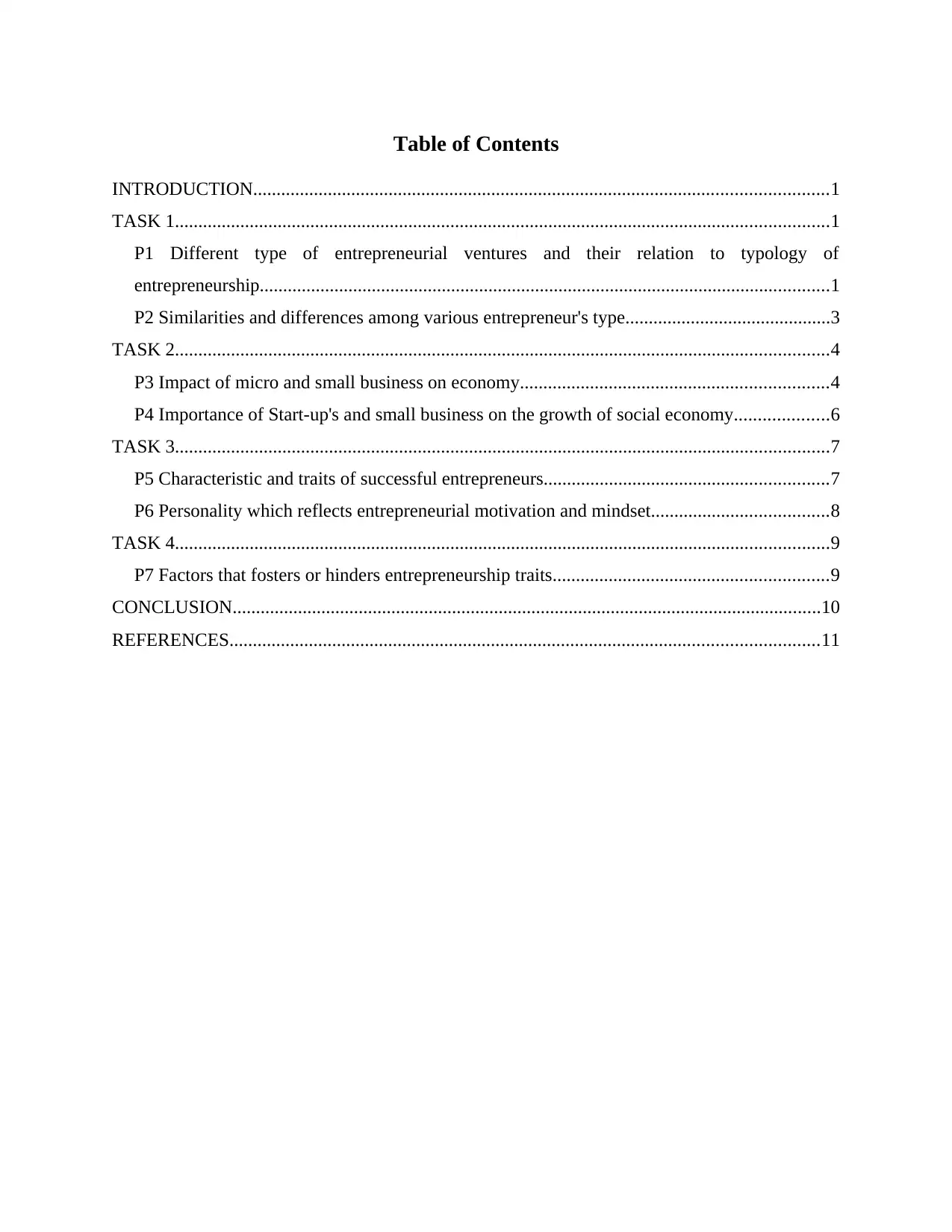
Table of Contents
INTRODUCTION...........................................................................................................................1
TASK 1............................................................................................................................................1
P1 Different type of entrepreneurial ventures and their relation to typology of
entrepreneurship..........................................................................................................................1
P2 Similarities and differences among various entrepreneur's type............................................3
TASK 2............................................................................................................................................4
P3 Impact of micro and small business on economy..................................................................4
P4 Importance of Start-up's and small business on the growth of social economy....................6
TASK 3............................................................................................................................................7
P5 Characteristic and traits of successful entrepreneurs.............................................................7
P6 Personality which reflects entrepreneurial motivation and mindset......................................8
TASK 4............................................................................................................................................9
P7 Factors that fosters or hinders entrepreneurship traits...........................................................9
CONCLUSION..............................................................................................................................10
REFERENCES..............................................................................................................................11
INTRODUCTION...........................................................................................................................1
TASK 1............................................................................................................................................1
P1 Different type of entrepreneurial ventures and their relation to typology of
entrepreneurship..........................................................................................................................1
P2 Similarities and differences among various entrepreneur's type............................................3
TASK 2............................................................................................................................................4
P3 Impact of micro and small business on economy..................................................................4
P4 Importance of Start-up's and small business on the growth of social economy....................6
TASK 3............................................................................................................................................7
P5 Characteristic and traits of successful entrepreneurs.............................................................7
P6 Personality which reflects entrepreneurial motivation and mindset......................................8
TASK 4............................................................................................................................................9
P7 Factors that fosters or hinders entrepreneurship traits...........................................................9
CONCLUSION..............................................................................................................................10
REFERENCES..............................................................................................................................11

⊘ This is a preview!⊘
Do you want full access?
Subscribe today to unlock all pages.

Trusted by 1+ million students worldwide
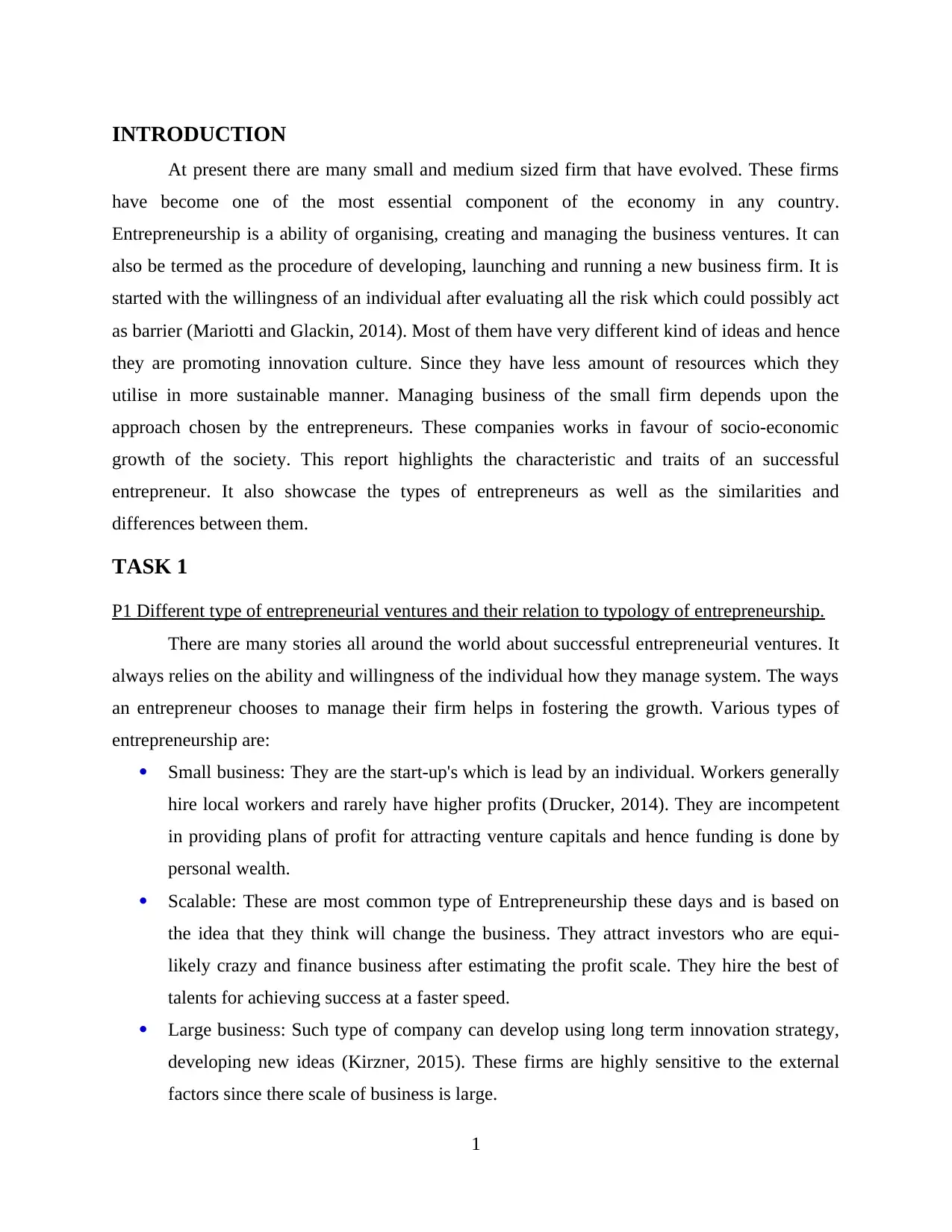
INTRODUCTION
At present there are many small and medium sized firm that have evolved. These firms
have become one of the most essential component of the economy in any country.
Entrepreneurship is a ability of organising, creating and managing the business ventures. It can
also be termed as the procedure of developing, launching and running a new business firm. It is
started with the willingness of an individual after evaluating all the risk which could possibly act
as barrier (Mariotti and Glackin, 2014). Most of them have very different kind of ideas and hence
they are promoting innovation culture. Since they have less amount of resources which they
utilise in more sustainable manner. Managing business of the small firm depends upon the
approach chosen by the entrepreneurs. These companies works in favour of socio-economic
growth of the society. This report highlights the characteristic and traits of an successful
entrepreneur. It also showcase the types of entrepreneurs as well as the similarities and
differences between them.
TASK 1
P1 Different type of entrepreneurial ventures and their relation to typology of entrepreneurship.
There are many stories all around the world about successful entrepreneurial ventures. It
always relies on the ability and willingness of the individual how they manage system. The ways
an entrepreneur chooses to manage their firm helps in fostering the growth. Various types of
entrepreneurship are:
Small business: They are the start-up's which is lead by an individual. Workers generally
hire local workers and rarely have higher profits (Drucker, 2014). They are incompetent
in providing plans of profit for attracting venture capitals and hence funding is done by
personal wealth.
Scalable: These are most common type of Entrepreneurship these days and is based on
the idea that they think will change the business. They attract investors who are equi-
likely crazy and finance business after estimating the profit scale. They hire the best of
talents for achieving success at a faster speed.
Large business: Such type of company can develop using long term innovation strategy,
developing new ideas (Kirzner, 2015). These firms are highly sensitive to the external
factors since there scale of business is large.
1
At present there are many small and medium sized firm that have evolved. These firms
have become one of the most essential component of the economy in any country.
Entrepreneurship is a ability of organising, creating and managing the business ventures. It can
also be termed as the procedure of developing, launching and running a new business firm. It is
started with the willingness of an individual after evaluating all the risk which could possibly act
as barrier (Mariotti and Glackin, 2014). Most of them have very different kind of ideas and hence
they are promoting innovation culture. Since they have less amount of resources which they
utilise in more sustainable manner. Managing business of the small firm depends upon the
approach chosen by the entrepreneurs. These companies works in favour of socio-economic
growth of the society. This report highlights the characteristic and traits of an successful
entrepreneur. It also showcase the types of entrepreneurs as well as the similarities and
differences between them.
TASK 1
P1 Different type of entrepreneurial ventures and their relation to typology of entrepreneurship.
There are many stories all around the world about successful entrepreneurial ventures. It
always relies on the ability and willingness of the individual how they manage system. The ways
an entrepreneur chooses to manage their firm helps in fostering the growth. Various types of
entrepreneurship are:
Small business: They are the start-up's which is lead by an individual. Workers generally
hire local workers and rarely have higher profits (Drucker, 2014). They are incompetent
in providing plans of profit for attracting venture capitals and hence funding is done by
personal wealth.
Scalable: These are most common type of Entrepreneurship these days and is based on
the idea that they think will change the business. They attract investors who are equi-
likely crazy and finance business after estimating the profit scale. They hire the best of
talents for achieving success at a faster speed.
Large business: Such type of company can develop using long term innovation strategy,
developing new ideas (Kirzner, 2015). These firms are highly sensitive to the external
factors since there scale of business is large.
1
Paraphrase This Document
Need a fresh take? Get an instant paraphrase of this document with our AI Paraphraser
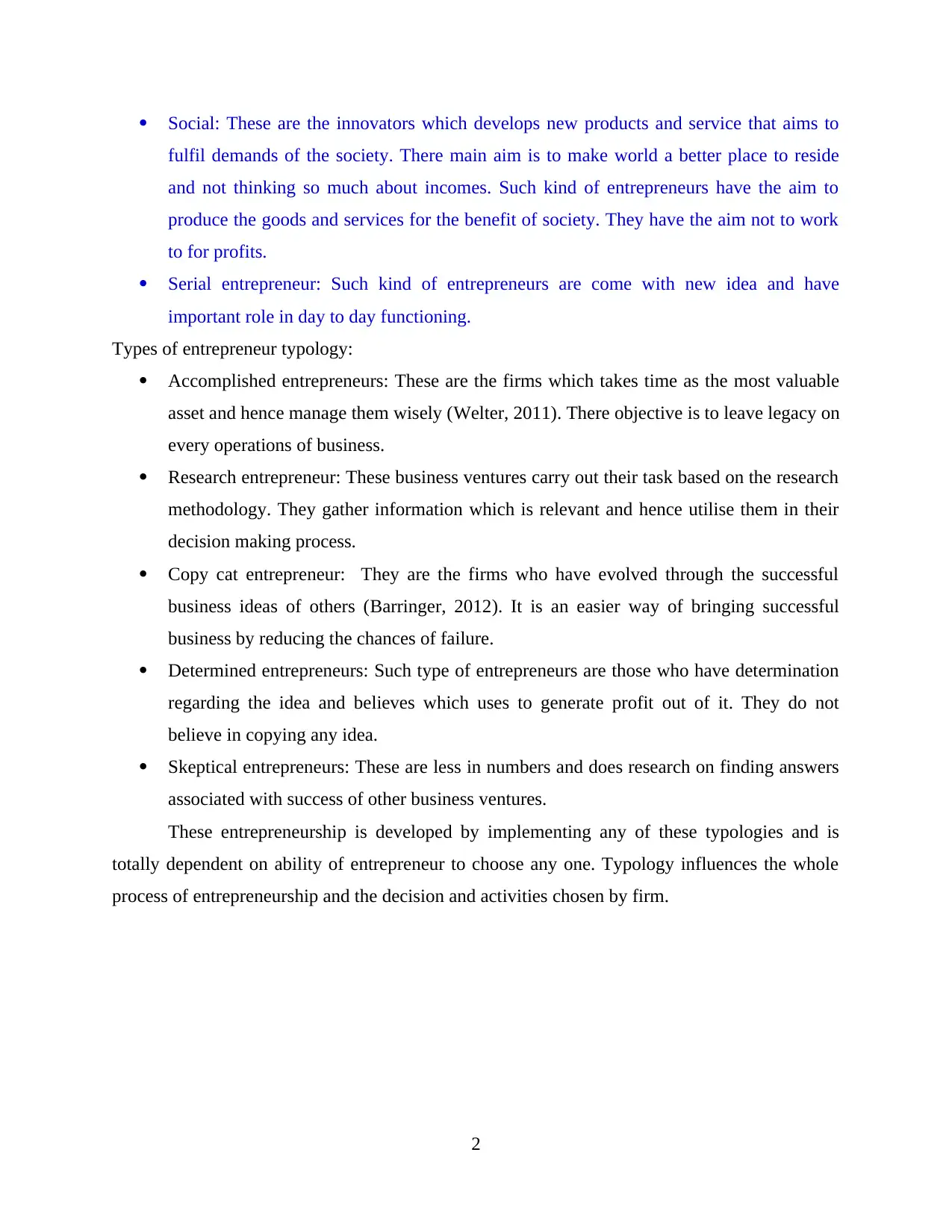
Social: These are the innovators which develops new products and service that aims to
fulfil demands of the society. There main aim is to make world a better place to reside
and not thinking so much about incomes. Such kind of entrepreneurs have the aim to
produce the goods and services for the benefit of society. They have the aim not to work
to for profits.
Serial entrepreneur: Such kind of entrepreneurs are come with new idea and have
important role in day to day functioning.
Types of entrepreneur typology:
Accomplished entrepreneurs: These are the firms which takes time as the most valuable
asset and hence manage them wisely (Welter, 2011). There objective is to leave legacy on
every operations of business.
Research entrepreneur: These business ventures carry out their task based on the research
methodology. They gather information which is relevant and hence utilise them in their
decision making process.
Copy cat entrepreneur: They are the firms who have evolved through the successful
business ideas of others (Barringer, 2012). It is an easier way of bringing successful
business by reducing the chances of failure.
Determined entrepreneurs: Such type of entrepreneurs are those who have determination
regarding the idea and believes which uses to generate profit out of it. They do not
believe in copying any idea.
Skeptical entrepreneurs: These are less in numbers and does research on finding answers
associated with success of other business ventures.
These entrepreneurship is developed by implementing any of these typologies and is
totally dependent on ability of entrepreneur to choose any one. Typology influences the whole
process of entrepreneurship and the decision and activities chosen by firm.
2
fulfil demands of the society. There main aim is to make world a better place to reside
and not thinking so much about incomes. Such kind of entrepreneurs have the aim to
produce the goods and services for the benefit of society. They have the aim not to work
to for profits.
Serial entrepreneur: Such kind of entrepreneurs are come with new idea and have
important role in day to day functioning.
Types of entrepreneur typology:
Accomplished entrepreneurs: These are the firms which takes time as the most valuable
asset and hence manage them wisely (Welter, 2011). There objective is to leave legacy on
every operations of business.
Research entrepreneur: These business ventures carry out their task based on the research
methodology. They gather information which is relevant and hence utilise them in their
decision making process.
Copy cat entrepreneur: They are the firms who have evolved through the successful
business ideas of others (Barringer, 2012). It is an easier way of bringing successful
business by reducing the chances of failure.
Determined entrepreneurs: Such type of entrepreneurs are those who have determination
regarding the idea and believes which uses to generate profit out of it. They do not
believe in copying any idea.
Skeptical entrepreneurs: These are less in numbers and does research on finding answers
associated with success of other business ventures.
These entrepreneurship is developed by implementing any of these typologies and is
totally dependent on ability of entrepreneur to choose any one. Typology influences the whole
process of entrepreneurship and the decision and activities chosen by firm.
2
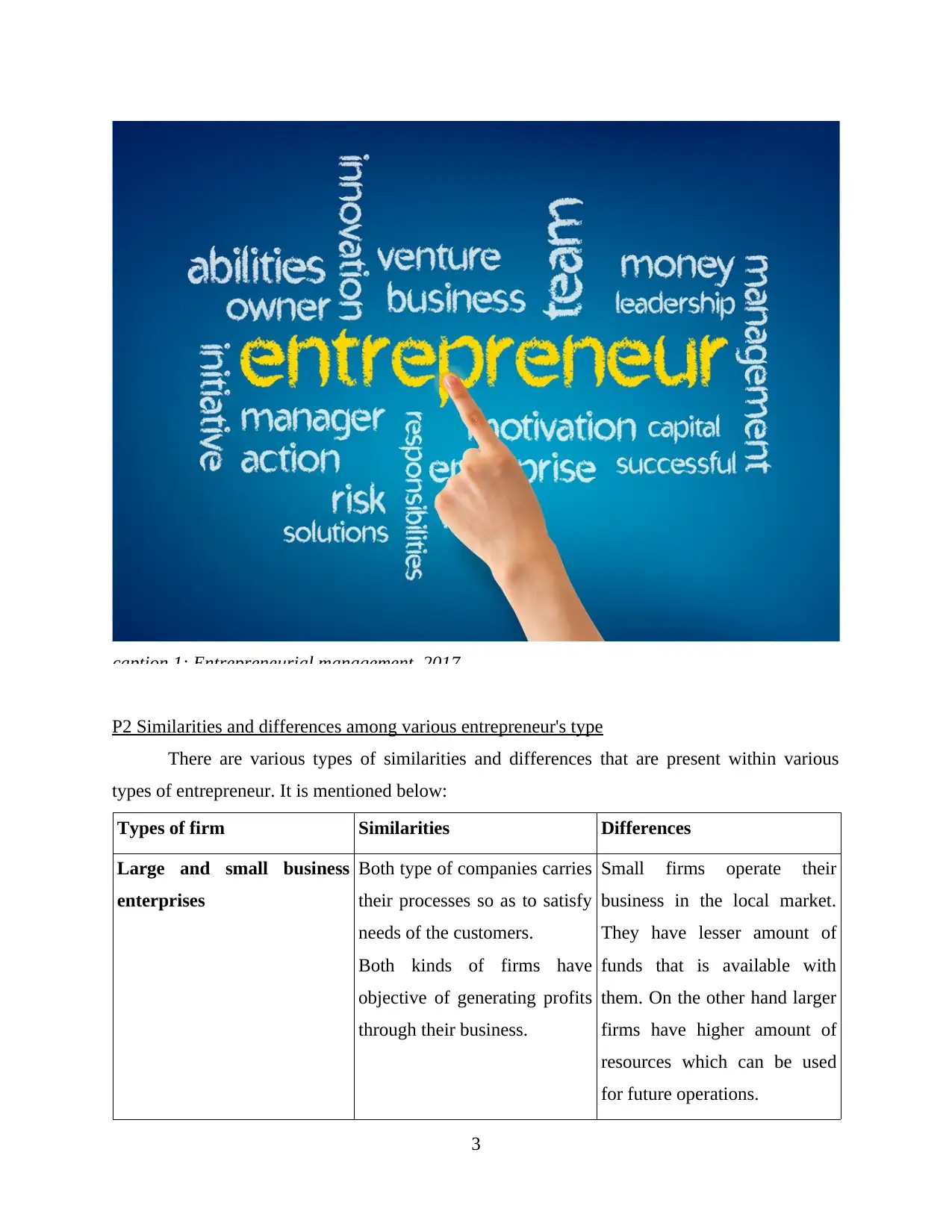
P2 Similarities and differences among various entrepreneur's type
There are various types of similarities and differences that are present within various
types of entrepreneur. It is mentioned below:
Types of firm Similarities Differences
Large and small business
enterprises
Both type of companies carries
their processes so as to satisfy
needs of the customers.
Both kinds of firms have
objective of generating profits
through their business.
Small firms operate their
business in the local market.
They have lesser amount of
funds that is available with
them. On the other hand larger
firms have higher amount of
resources which can be used
for future operations.
3
caption 1: Entrepreneurial management, 2017
There are various types of similarities and differences that are present within various
types of entrepreneur. It is mentioned below:
Types of firm Similarities Differences
Large and small business
enterprises
Both type of companies carries
their processes so as to satisfy
needs of the customers.
Both kinds of firms have
objective of generating profits
through their business.
Small firms operate their
business in the local market.
They have lesser amount of
funds that is available with
them. On the other hand larger
firms have higher amount of
resources which can be used
for future operations.
3
caption 1: Entrepreneurial management, 2017
⊘ This is a preview!⊘
Do you want full access?
Subscribe today to unlock all pages.

Trusted by 1+ million students worldwide
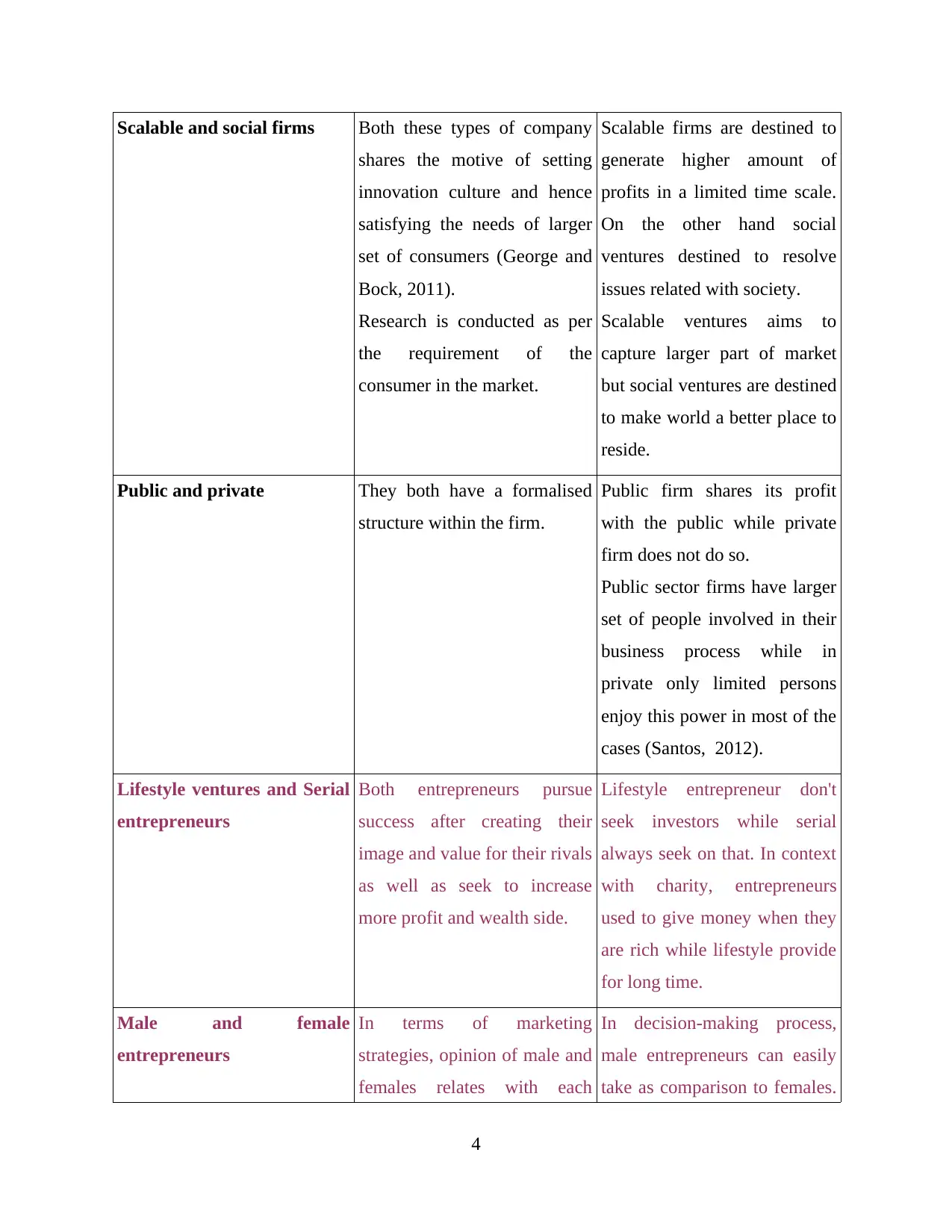
Scalable and social firms Both these types of company
shares the motive of setting
innovation culture and hence
satisfying the needs of larger
set of consumers (George and
Bock, 2011).
Research is conducted as per
the requirement of the
consumer in the market.
Scalable firms are destined to
generate higher amount of
profits in a limited time scale.
On the other hand social
ventures destined to resolve
issues related with society.
Scalable ventures aims to
capture larger part of market
but social ventures are destined
to make world a better place to
reside.
Public and private They both have a formalised
structure within the firm.
Public firm shares its profit
with the public while private
firm does not do so.
Public sector firms have larger
set of people involved in their
business process while in
private only limited persons
enjoy this power in most of the
cases (Santos, 2012).
Lifestyle ventures and Serial
entrepreneurs
Both entrepreneurs pursue
success after creating their
image and value for their rivals
as well as seek to increase
more profit and wealth side.
Lifestyle entrepreneur don't
seek investors while serial
always seek on that. In context
with charity, entrepreneurs
used to give money when they
are rich while lifestyle provide
for long time.
Male and female
entrepreneurs
In terms of marketing
strategies, opinion of male and
females relates with each
In decision-making process,
male entrepreneurs can easily
take as comparison to females.
4
shares the motive of setting
innovation culture and hence
satisfying the needs of larger
set of consumers (George and
Bock, 2011).
Research is conducted as per
the requirement of the
consumer in the market.
Scalable firms are destined to
generate higher amount of
profits in a limited time scale.
On the other hand social
ventures destined to resolve
issues related with society.
Scalable ventures aims to
capture larger part of market
but social ventures are destined
to make world a better place to
reside.
Public and private They both have a formalised
structure within the firm.
Public firm shares its profit
with the public while private
firm does not do so.
Public sector firms have larger
set of people involved in their
business process while in
private only limited persons
enjoy this power in most of the
cases (Santos, 2012).
Lifestyle ventures and Serial
entrepreneurs
Both entrepreneurs pursue
success after creating their
image and value for their rivals
as well as seek to increase
more profit and wealth side.
Lifestyle entrepreneur don't
seek investors while serial
always seek on that. In context
with charity, entrepreneurs
used to give money when they
are rich while lifestyle provide
for long time.
Male and female
entrepreneurs
In terms of marketing
strategies, opinion of male and
females relates with each
In decision-making process,
male entrepreneurs can easily
take as comparison to females.
4
Paraphrase This Document
Need a fresh take? Get an instant paraphrase of this document with our AI Paraphraser
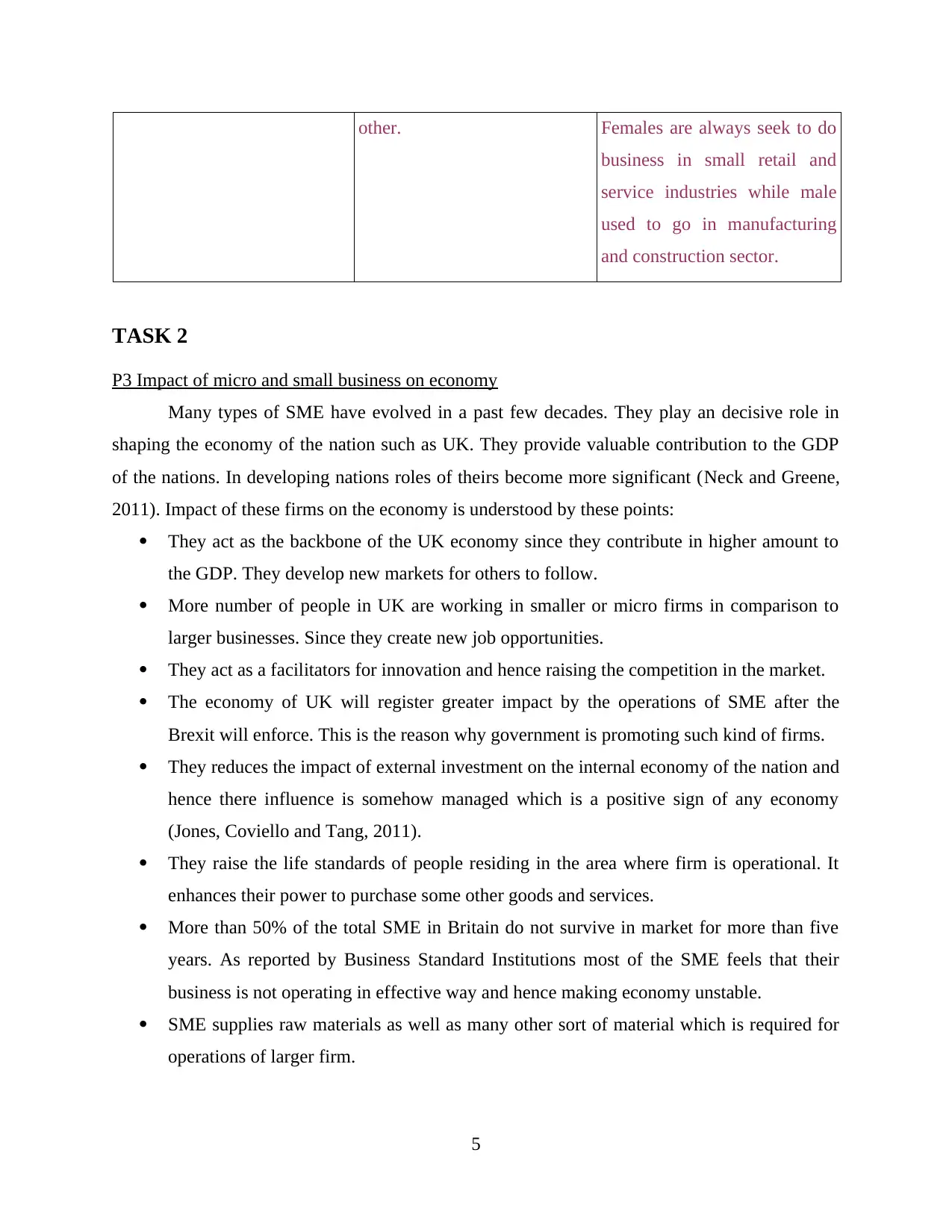
other. Females are always seek to do
business in small retail and
service industries while male
used to go in manufacturing
and construction sector.
TASK 2
P3 Impact of micro and small business on economy
Many types of SME have evolved in a past few decades. They play an decisive role in
shaping the economy of the nation such as UK. They provide valuable contribution to the GDP
of the nations. In developing nations roles of theirs become more significant (Neck and Greene,
2011). Impact of these firms on the economy is understood by these points:
They act as the backbone of the UK economy since they contribute in higher amount to
the GDP. They develop new markets for others to follow.
More number of people in UK are working in smaller or micro firms in comparison to
larger businesses. Since they create new job opportunities.
They act as a facilitators for innovation and hence raising the competition in the market.
The economy of UK will register greater impact by the operations of SME after the
Brexit will enforce. This is the reason why government is promoting such kind of firms.
They reduces the impact of external investment on the internal economy of the nation and
hence there influence is somehow managed which is a positive sign of any economy
(Jones, Coviello and Tang, 2011).
They raise the life standards of people residing in the area where firm is operational. It
enhances their power to purchase some other goods and services.
More than 50% of the total SME in Britain do not survive in market for more than five
years. As reported by Business Standard Institutions most of the SME feels that their
business is not operating in effective way and hence making economy unstable.
SME supplies raw materials as well as many other sort of material which is required for
operations of larger firm.
5
business in small retail and
service industries while male
used to go in manufacturing
and construction sector.
TASK 2
P3 Impact of micro and small business on economy
Many types of SME have evolved in a past few decades. They play an decisive role in
shaping the economy of the nation such as UK. They provide valuable contribution to the GDP
of the nations. In developing nations roles of theirs become more significant (Neck and Greene,
2011). Impact of these firms on the economy is understood by these points:
They act as the backbone of the UK economy since they contribute in higher amount to
the GDP. They develop new markets for others to follow.
More number of people in UK are working in smaller or micro firms in comparison to
larger businesses. Since they create new job opportunities.
They act as a facilitators for innovation and hence raising the competition in the market.
The economy of UK will register greater impact by the operations of SME after the
Brexit will enforce. This is the reason why government is promoting such kind of firms.
They reduces the impact of external investment on the internal economy of the nation and
hence there influence is somehow managed which is a positive sign of any economy
(Jones, Coviello and Tang, 2011).
They raise the life standards of people residing in the area where firm is operational. It
enhances their power to purchase some other goods and services.
More than 50% of the total SME in Britain do not survive in market for more than five
years. As reported by Business Standard Institutions most of the SME feels that their
business is not operating in effective way and hence making economy unstable.
SME supplies raw materials as well as many other sort of material which is required for
operations of larger firm.
5
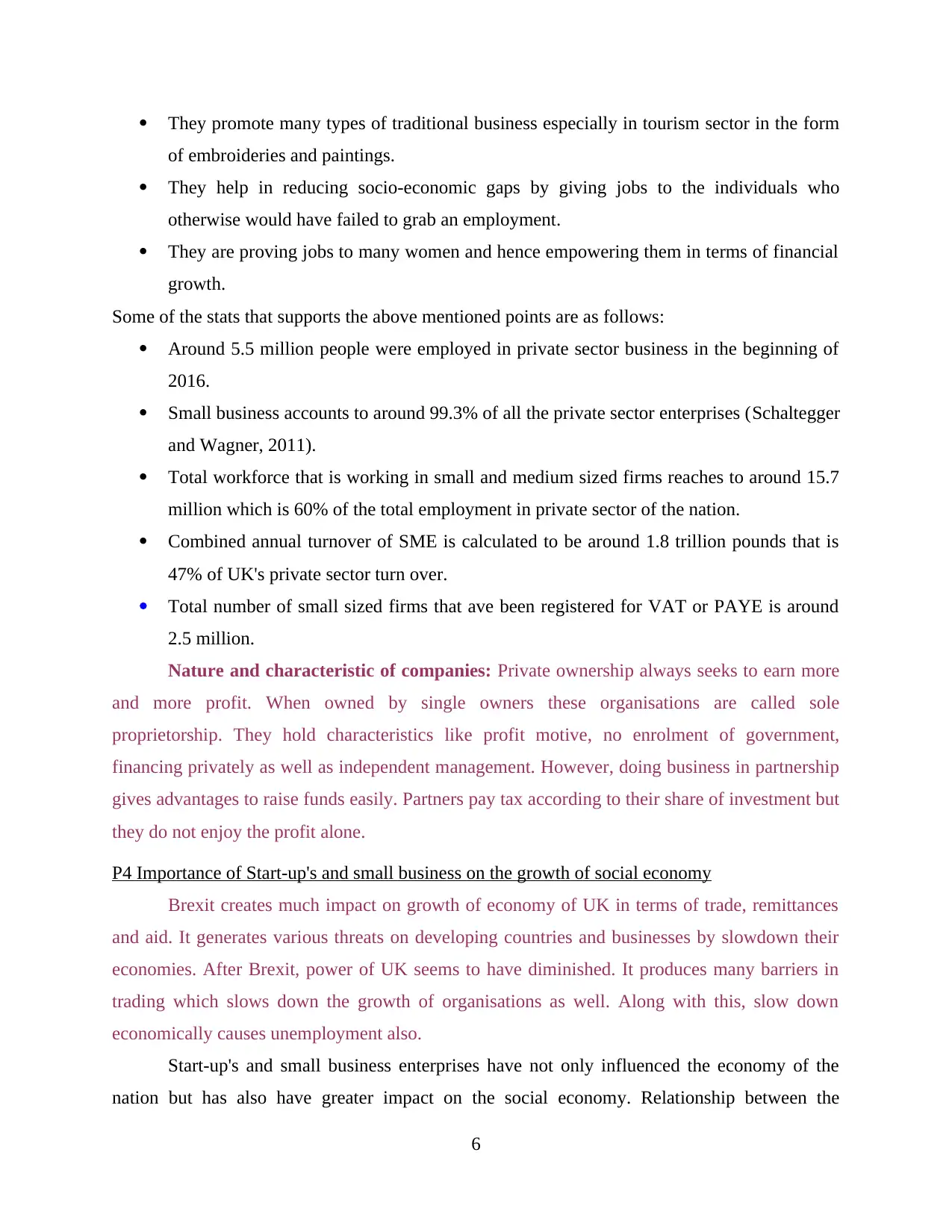
They promote many types of traditional business especially in tourism sector in the form
of embroideries and paintings.
They help in reducing socio-economic gaps by giving jobs to the individuals who
otherwise would have failed to grab an employment.
They are proving jobs to many women and hence empowering them in terms of financial
growth.
Some of the stats that supports the above mentioned points are as follows:
Around 5.5 million people were employed in private sector business in the beginning of
2016.
Small business accounts to around 99.3% of all the private sector enterprises (Schaltegger
and Wagner, 2011).
Total workforce that is working in small and medium sized firms reaches to around 15.7
million which is 60% of the total employment in private sector of the nation.
Combined annual turnover of SME is calculated to be around 1.8 trillion pounds that is
47% of UK's private sector turn over.
Total number of small sized firms that ave been registered for VAT or PAYE is around
2.5 million.
Nature and characteristic of companies: Private ownership always seeks to earn more
and more profit. When owned by single owners these organisations are called sole
proprietorship. They hold characteristics like profit motive, no enrolment of government,
financing privately as well as independent management. However, doing business in partnership
gives advantages to raise funds easily. Partners pay tax according to their share of investment but
they do not enjoy the profit alone.
P4 Importance of Start-up's and small business on the growth of social economy
Brexit creates much impact on growth of economy of UK in terms of trade, remittances
and aid. It generates various threats on developing countries and businesses by slowdown their
economies. After Brexit, power of UK seems to have diminished. It produces many barriers in
trading which slows down the growth of organisations as well. Along with this, slow down
economically causes unemployment also.
Start-up's and small business enterprises have not only influenced the economy of the
nation but has also have greater impact on the social economy. Relationship between the
6
of embroideries and paintings.
They help in reducing socio-economic gaps by giving jobs to the individuals who
otherwise would have failed to grab an employment.
They are proving jobs to many women and hence empowering them in terms of financial
growth.
Some of the stats that supports the above mentioned points are as follows:
Around 5.5 million people were employed in private sector business in the beginning of
2016.
Small business accounts to around 99.3% of all the private sector enterprises (Schaltegger
and Wagner, 2011).
Total workforce that is working in small and medium sized firms reaches to around 15.7
million which is 60% of the total employment in private sector of the nation.
Combined annual turnover of SME is calculated to be around 1.8 trillion pounds that is
47% of UK's private sector turn over.
Total number of small sized firms that ave been registered for VAT or PAYE is around
2.5 million.
Nature and characteristic of companies: Private ownership always seeks to earn more
and more profit. When owned by single owners these organisations are called sole
proprietorship. They hold characteristics like profit motive, no enrolment of government,
financing privately as well as independent management. However, doing business in partnership
gives advantages to raise funds easily. Partners pay tax according to their share of investment but
they do not enjoy the profit alone.
P4 Importance of Start-up's and small business on the growth of social economy
Brexit creates much impact on growth of economy of UK in terms of trade, remittances
and aid. It generates various threats on developing countries and businesses by slowdown their
economies. After Brexit, power of UK seems to have diminished. It produces many barriers in
trading which slows down the growth of organisations as well. Along with this, slow down
economically causes unemployment also.
Start-up's and small business enterprises have not only influenced the economy of the
nation but has also have greater impact on the social economy. Relationship between the
6
⊘ This is a preview!⊘
Do you want full access?
Subscribe today to unlock all pages.

Trusted by 1+ million students worldwide
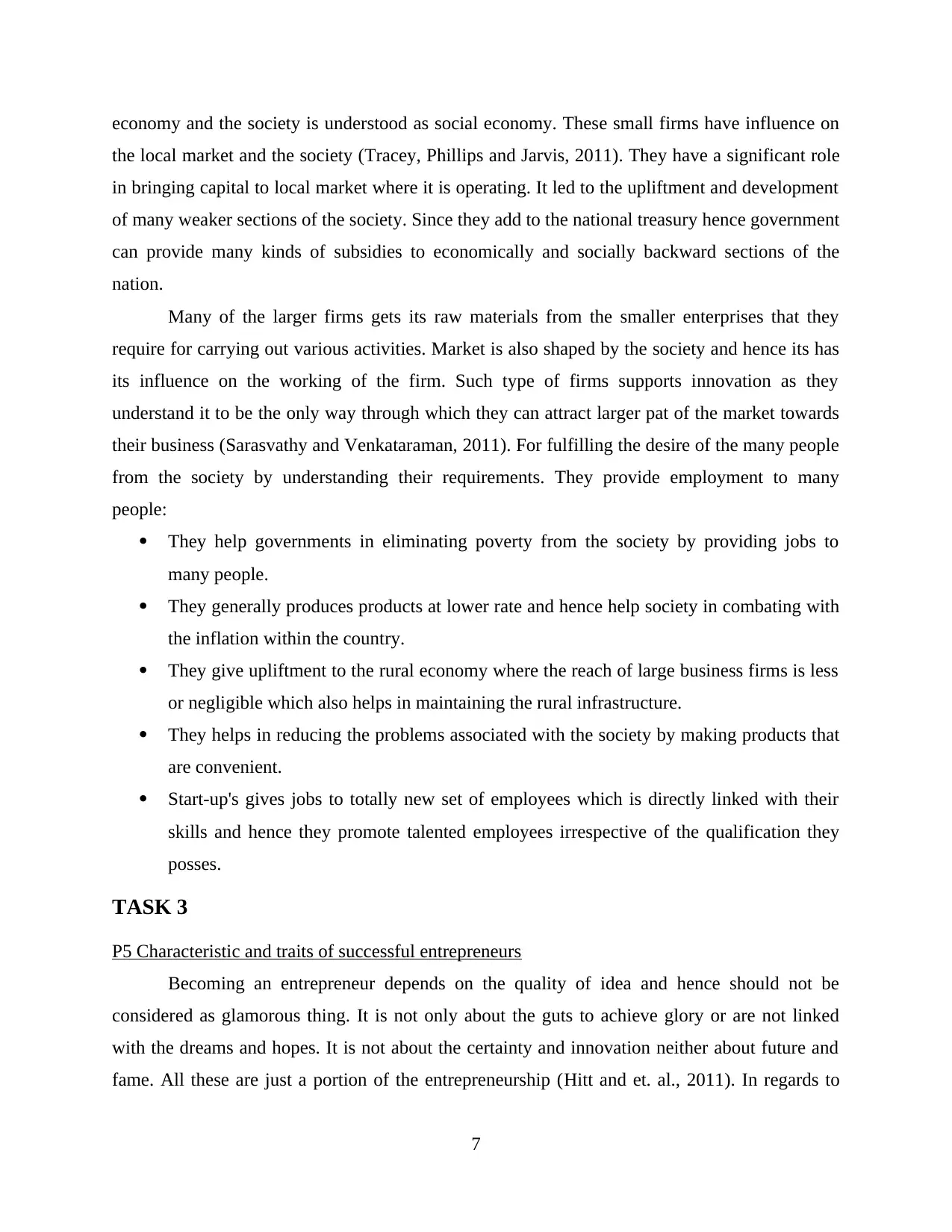
economy and the society is understood as social economy. These small firms have influence on
the local market and the society (Tracey, Phillips and Jarvis, 2011). They have a significant role
in bringing capital to local market where it is operating. It led to the upliftment and development
of many weaker sections of the society. Since they add to the national treasury hence government
can provide many kinds of subsidies to economically and socially backward sections of the
nation.
Many of the larger firms gets its raw materials from the smaller enterprises that they
require for carrying out various activities. Market is also shaped by the society and hence its has
its influence on the working of the firm. Such type of firms supports innovation as they
understand it to be the only way through which they can attract larger pat of the market towards
their business (Sarasvathy and Venkataraman, 2011). For fulfilling the desire of the many people
from the society by understanding their requirements. They provide employment to many
people:
They help governments in eliminating poverty from the society by providing jobs to
many people.
They generally produces products at lower rate and hence help society in combating with
the inflation within the country.
They give upliftment to the rural economy where the reach of large business firms is less
or negligible which also helps in maintaining the rural infrastructure.
They helps in reducing the problems associated with the society by making products that
are convenient.
Start-up's gives jobs to totally new set of employees which is directly linked with their
skills and hence they promote talented employees irrespective of the qualification they
posses.
TASK 3
P5 Characteristic and traits of successful entrepreneurs
Becoming an entrepreneur depends on the quality of idea and hence should not be
considered as glamorous thing. It is not only about the guts to achieve glory or are not linked
with the dreams and hopes. It is not about the certainty and innovation neither about future and
fame. All these are just a portion of the entrepreneurship (Hitt and et. al., 2011). In regards to
7
the local market and the society (Tracey, Phillips and Jarvis, 2011). They have a significant role
in bringing capital to local market where it is operating. It led to the upliftment and development
of many weaker sections of the society. Since they add to the national treasury hence government
can provide many kinds of subsidies to economically and socially backward sections of the
nation.
Many of the larger firms gets its raw materials from the smaller enterprises that they
require for carrying out various activities. Market is also shaped by the society and hence its has
its influence on the working of the firm. Such type of firms supports innovation as they
understand it to be the only way through which they can attract larger pat of the market towards
their business (Sarasvathy and Venkataraman, 2011). For fulfilling the desire of the many people
from the society by understanding their requirements. They provide employment to many
people:
They help governments in eliminating poverty from the society by providing jobs to
many people.
They generally produces products at lower rate and hence help society in combating with
the inflation within the country.
They give upliftment to the rural economy where the reach of large business firms is less
or negligible which also helps in maintaining the rural infrastructure.
They helps in reducing the problems associated with the society by making products that
are convenient.
Start-up's gives jobs to totally new set of employees which is directly linked with their
skills and hence they promote talented employees irrespective of the qualification they
posses.
TASK 3
P5 Characteristic and traits of successful entrepreneurs
Becoming an entrepreneur depends on the quality of idea and hence should not be
considered as glamorous thing. It is not only about the guts to achieve glory or are not linked
with the dreams and hopes. It is not about the certainty and innovation neither about future and
fame. All these are just a portion of the entrepreneurship (Hitt and et. al., 2011). In regards to
7
Paraphrase This Document
Need a fresh take? Get an instant paraphrase of this document with our AI Paraphraser
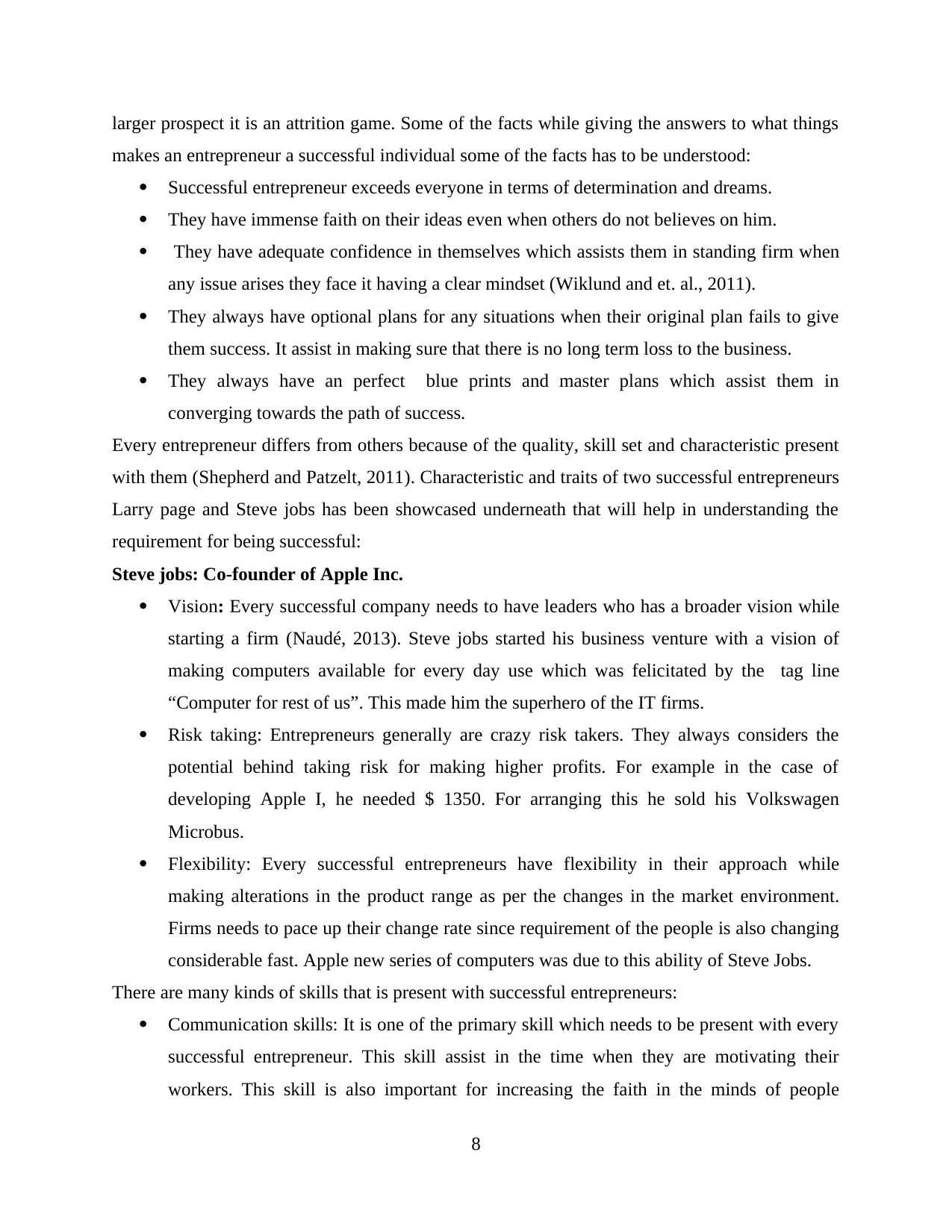
larger prospect it is an attrition game. Some of the facts while giving the answers to what things
makes an entrepreneur a successful individual some of the facts has to be understood:
Successful entrepreneur exceeds everyone in terms of determination and dreams.
They have immense faith on their ideas even when others do not believes on him.
They have adequate confidence in themselves which assists them in standing firm when
any issue arises they face it having a clear mindset (Wiklund and et. al., 2011).
They always have optional plans for any situations when their original plan fails to give
them success. It assist in making sure that there is no long term loss to the business.
They always have an perfect blue prints and master plans which assist them in
converging towards the path of success.
Every entrepreneur differs from others because of the quality, skill set and characteristic present
with them (Shepherd and Patzelt, 2011). Characteristic and traits of two successful entrepreneurs
Larry page and Steve jobs has been showcased underneath that will help in understanding the
requirement for being successful:
Steve jobs: Co-founder of Apple Inc.
Vision: Every successful company needs to have leaders who has a broader vision while
starting a firm (Naudé, 2013). Steve jobs started his business venture with a vision of
making computers available for every day use which was felicitated by the tag line
“Computer for rest of us”. This made him the superhero of the IT firms.
Risk taking: Entrepreneurs generally are crazy risk takers. They always considers the
potential behind taking risk for making higher profits. For example in the case of
developing Apple I, he needed $ 1350. For arranging this he sold his Volkswagen
Microbus.
Flexibility: Every successful entrepreneurs have flexibility in their approach while
making alterations in the product range as per the changes in the market environment.
Firms needs to pace up their change rate since requirement of the people is also changing
considerable fast. Apple new series of computers was due to this ability of Steve Jobs.
There are many kinds of skills that is present with successful entrepreneurs:
Communication skills: It is one of the primary skill which needs to be present with every
successful entrepreneur. This skill assist in the time when they are motivating their
workers. This skill is also important for increasing the faith in the minds of people
8
makes an entrepreneur a successful individual some of the facts has to be understood:
Successful entrepreneur exceeds everyone in terms of determination and dreams.
They have immense faith on their ideas even when others do not believes on him.
They have adequate confidence in themselves which assists them in standing firm when
any issue arises they face it having a clear mindset (Wiklund and et. al., 2011).
They always have optional plans for any situations when their original plan fails to give
them success. It assist in making sure that there is no long term loss to the business.
They always have an perfect blue prints and master plans which assist them in
converging towards the path of success.
Every entrepreneur differs from others because of the quality, skill set and characteristic present
with them (Shepherd and Patzelt, 2011). Characteristic and traits of two successful entrepreneurs
Larry page and Steve jobs has been showcased underneath that will help in understanding the
requirement for being successful:
Steve jobs: Co-founder of Apple Inc.
Vision: Every successful company needs to have leaders who has a broader vision while
starting a firm (Naudé, 2013). Steve jobs started his business venture with a vision of
making computers available for every day use which was felicitated by the tag line
“Computer for rest of us”. This made him the superhero of the IT firms.
Risk taking: Entrepreneurs generally are crazy risk takers. They always considers the
potential behind taking risk for making higher profits. For example in the case of
developing Apple I, he needed $ 1350. For arranging this he sold his Volkswagen
Microbus.
Flexibility: Every successful entrepreneurs have flexibility in their approach while
making alterations in the product range as per the changes in the market environment.
Firms needs to pace up their change rate since requirement of the people is also changing
considerable fast. Apple new series of computers was due to this ability of Steve Jobs.
There are many kinds of skills that is present with successful entrepreneurs:
Communication skills: It is one of the primary skill which needs to be present with every
successful entrepreneur. This skill assist in the time when they are motivating their
workers. This skill is also important for increasing the faith in the minds of people
8
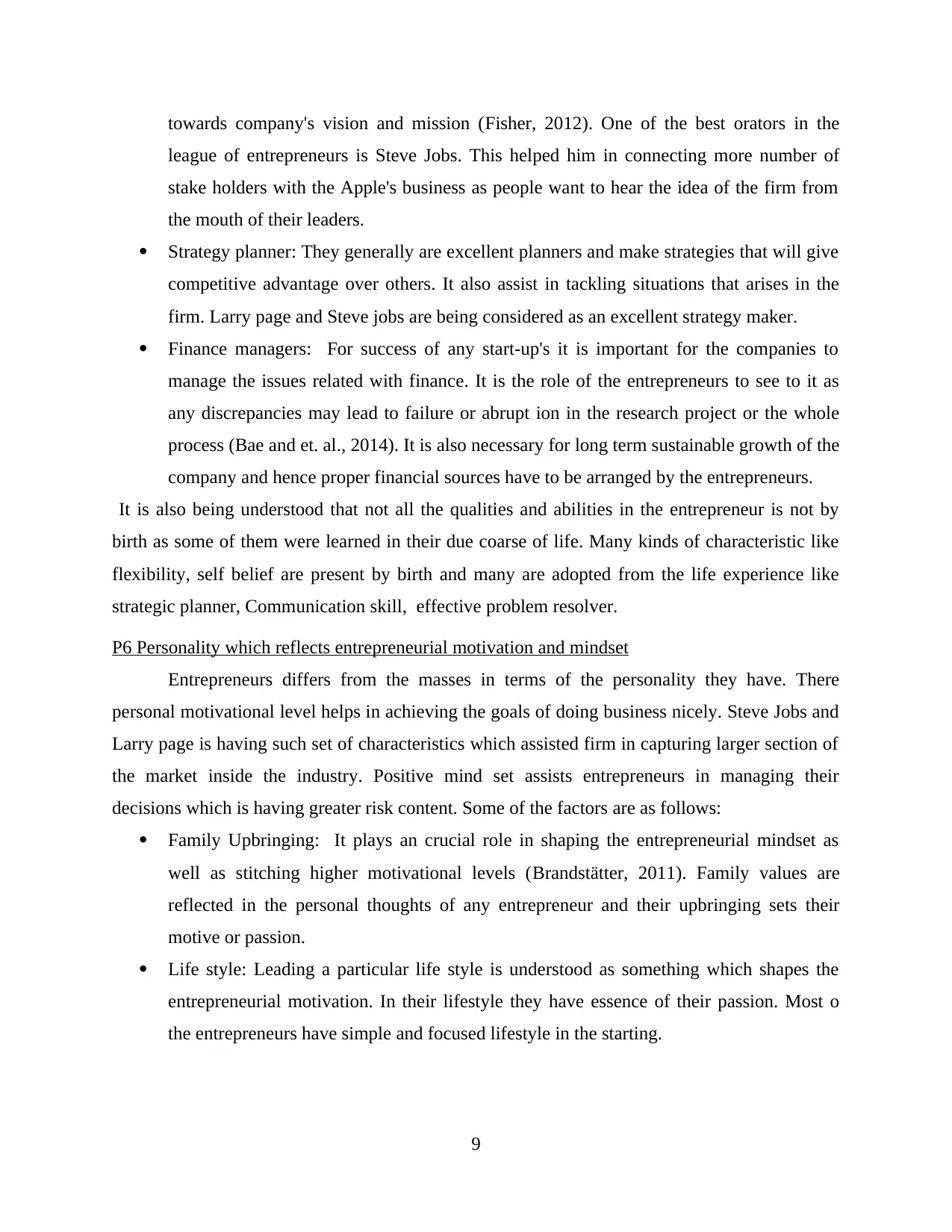
towards company's vision and mission (Fisher, 2012). One of the best orators in the
league of entrepreneurs is Steve Jobs. This helped him in connecting more number of
stake holders with the Apple's business as people want to hear the idea of the firm from
the mouth of their leaders.
Strategy planner: They generally are excellent planners and make strategies that will give
competitive advantage over others. It also assist in tackling situations that arises in the
firm. Larry page and Steve jobs are being considered as an excellent strategy maker.
Finance managers: For success of any start-up's it is important for the companies to
manage the issues related with finance. It is the role of the entrepreneurs to see to it as
any discrepancies may lead to failure or abrupt ion in the research project or the whole
process (Bae and et. al., 2014). It is also necessary for long term sustainable growth of the
company and hence proper financial sources have to be arranged by the entrepreneurs.
It is also being understood that not all the qualities and abilities in the entrepreneur is not by
birth as some of them were learned in their due coarse of life. Many kinds of characteristic like
flexibility, self belief are present by birth and many are adopted from the life experience like
strategic planner, Communication skill, effective problem resolver.
P6 Personality which reflects entrepreneurial motivation and mindset
Entrepreneurs differs from the masses in terms of the personality they have. There
personal motivational level helps in achieving the goals of doing business nicely. Steve Jobs and
Larry page is having such set of characteristics which assisted firm in capturing larger section of
the market inside the industry. Positive mind set assists entrepreneurs in managing their
decisions which is having greater risk content. Some of the factors are as follows:
Family Upbringing: It plays an crucial role in shaping the entrepreneurial mindset as
well as stitching higher motivational levels (Brandstätter, 2011). Family values are
reflected in the personal thoughts of any entrepreneur and their upbringing sets their
motive or passion.
Life style: Leading a particular life style is understood as something which shapes the
entrepreneurial motivation. In their lifestyle they have essence of their passion. Most o
the entrepreneurs have simple and focused lifestyle in the starting.
9
league of entrepreneurs is Steve Jobs. This helped him in connecting more number of
stake holders with the Apple's business as people want to hear the idea of the firm from
the mouth of their leaders.
Strategy planner: They generally are excellent planners and make strategies that will give
competitive advantage over others. It also assist in tackling situations that arises in the
firm. Larry page and Steve jobs are being considered as an excellent strategy maker.
Finance managers: For success of any start-up's it is important for the companies to
manage the issues related with finance. It is the role of the entrepreneurs to see to it as
any discrepancies may lead to failure or abrupt ion in the research project or the whole
process (Bae and et. al., 2014). It is also necessary for long term sustainable growth of the
company and hence proper financial sources have to be arranged by the entrepreneurs.
It is also being understood that not all the qualities and abilities in the entrepreneur is not by
birth as some of them were learned in their due coarse of life. Many kinds of characteristic like
flexibility, self belief are present by birth and many are adopted from the life experience like
strategic planner, Communication skill, effective problem resolver.
P6 Personality which reflects entrepreneurial motivation and mindset
Entrepreneurs differs from the masses in terms of the personality they have. There
personal motivational level helps in achieving the goals of doing business nicely. Steve Jobs and
Larry page is having such set of characteristics which assisted firm in capturing larger section of
the market inside the industry. Positive mind set assists entrepreneurs in managing their
decisions which is having greater risk content. Some of the factors are as follows:
Family Upbringing: It plays an crucial role in shaping the entrepreneurial mindset as
well as stitching higher motivational levels (Brandstätter, 2011). Family values are
reflected in the personal thoughts of any entrepreneur and their upbringing sets their
motive or passion.
Life style: Leading a particular life style is understood as something which shapes the
entrepreneurial motivation. In their lifestyle they have essence of their passion. Most o
the entrepreneurs have simple and focused lifestyle in the starting.
9
⊘ This is a preview!⊘
Do you want full access?
Subscribe today to unlock all pages.

Trusted by 1+ million students worldwide
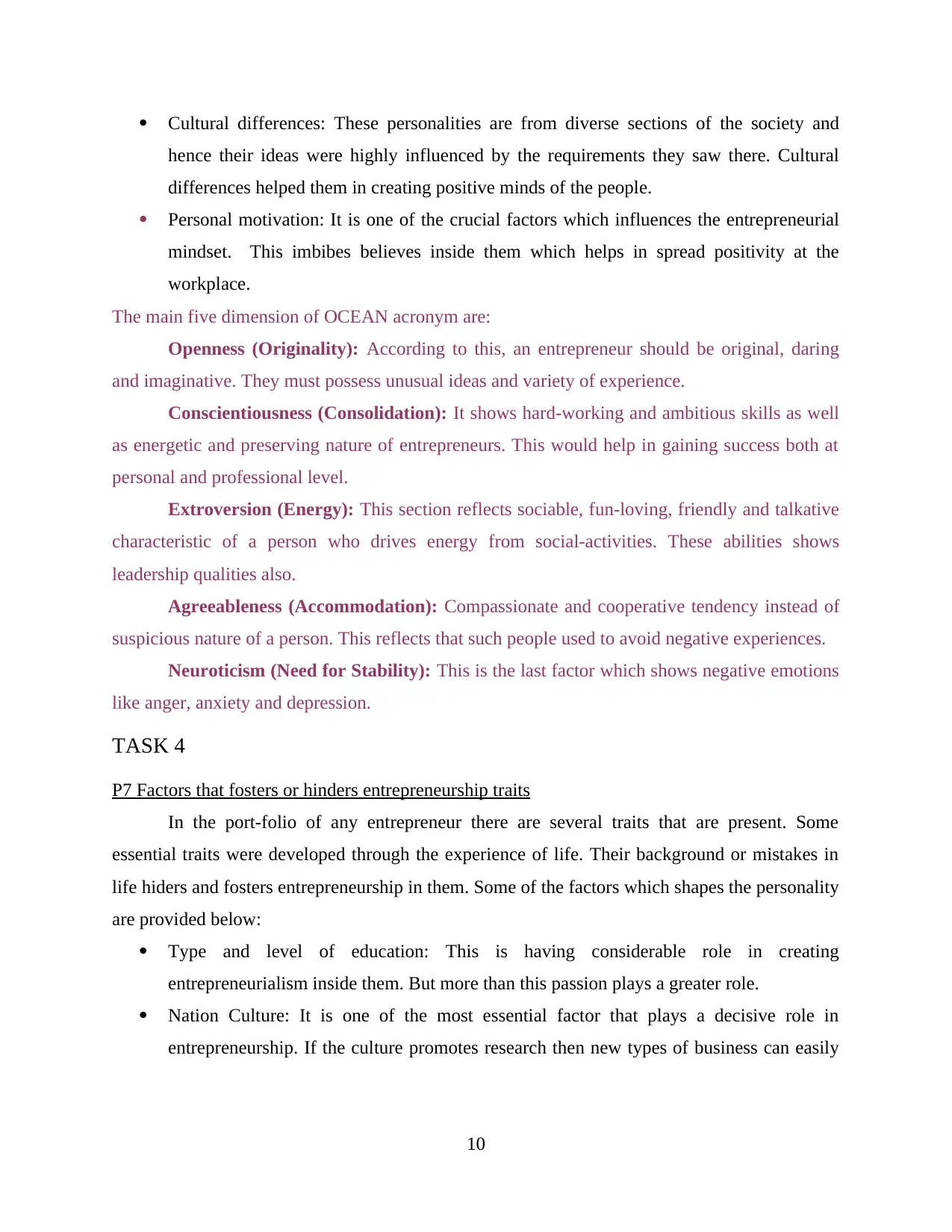
Cultural differences: These personalities are from diverse sections of the society and
hence their ideas were highly influenced by the requirements they saw there. Cultural
differences helped them in creating positive minds of the people.
Personal motivation: It is one of the crucial factors which influences the entrepreneurial
mindset. This imbibes believes inside them which helps in spread positivity at the
workplace.
The main five dimension of OCEAN acronym are:
Openness (Originality): According to this, an entrepreneur should be original, daring
and imaginative. They must possess unusual ideas and variety of experience.
Conscientiousness (Consolidation): It shows hard-working and ambitious skills as well
as energetic and preserving nature of entrepreneurs. This would help in gaining success both at
personal and professional level.
Extroversion (Energy): This section reflects sociable, fun-loving, friendly and talkative
characteristic of a person who drives energy from social-activities. These abilities shows
leadership qualities also.
Agreeableness (Accommodation): Compassionate and cooperative tendency instead of
suspicious nature of a person. This reflects that such people used to avoid negative experiences.
Neuroticism (Need for Stability): This is the last factor which shows negative emotions
like anger, anxiety and depression.
TASK 4
P7 Factors that fosters or hinders entrepreneurship traits
In the port-folio of any entrepreneur there are several traits that are present. Some
essential traits were developed through the experience of life. Their background or mistakes in
life hiders and fosters entrepreneurship in them. Some of the factors which shapes the personality
are provided below:
Type and level of education: This is having considerable role in creating
entrepreneurialism inside them. But more than this passion plays a greater role.
Nation Culture: It is one of the most essential factor that plays a decisive role in
entrepreneurship. If the culture promotes research then new types of business can easily
10
hence their ideas were highly influenced by the requirements they saw there. Cultural
differences helped them in creating positive minds of the people.
Personal motivation: It is one of the crucial factors which influences the entrepreneurial
mindset. This imbibes believes inside them which helps in spread positivity at the
workplace.
The main five dimension of OCEAN acronym are:
Openness (Originality): According to this, an entrepreneur should be original, daring
and imaginative. They must possess unusual ideas and variety of experience.
Conscientiousness (Consolidation): It shows hard-working and ambitious skills as well
as energetic and preserving nature of entrepreneurs. This would help in gaining success both at
personal and professional level.
Extroversion (Energy): This section reflects sociable, fun-loving, friendly and talkative
characteristic of a person who drives energy from social-activities. These abilities shows
leadership qualities also.
Agreeableness (Accommodation): Compassionate and cooperative tendency instead of
suspicious nature of a person. This reflects that such people used to avoid negative experiences.
Neuroticism (Need for Stability): This is the last factor which shows negative emotions
like anger, anxiety and depression.
TASK 4
P7 Factors that fosters or hinders entrepreneurship traits
In the port-folio of any entrepreneur there are several traits that are present. Some
essential traits were developed through the experience of life. Their background or mistakes in
life hiders and fosters entrepreneurship in them. Some of the factors which shapes the personality
are provided below:
Type and level of education: This is having considerable role in creating
entrepreneurialism inside them. But more than this passion plays a greater role.
Nation Culture: It is one of the most essential factor that plays a decisive role in
entrepreneurship. If the culture promotes research then new types of business can easily
10
Paraphrase This Document
Need a fresh take? Get an instant paraphrase of this document with our AI Paraphraser
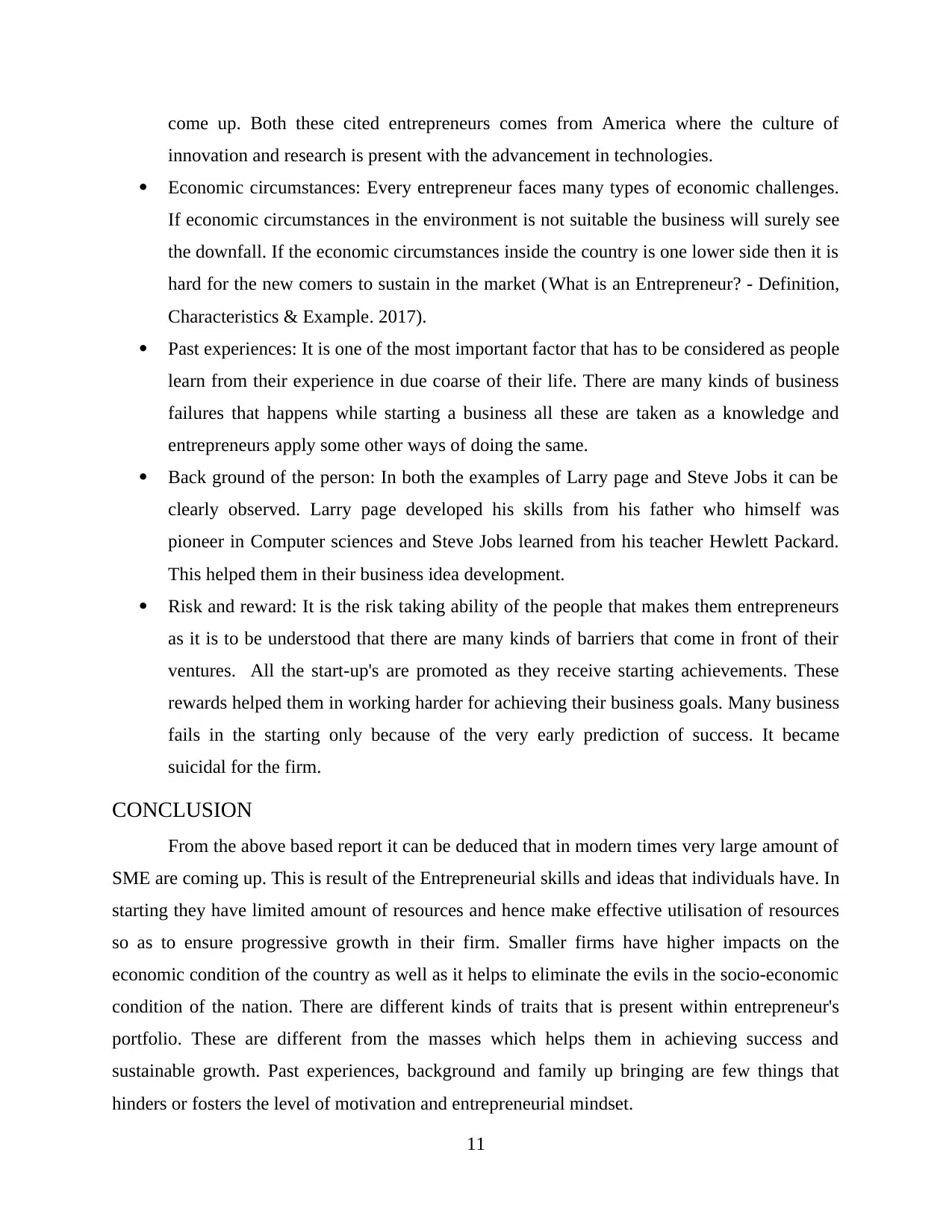
come up. Both these cited entrepreneurs comes from America where the culture of
innovation and research is present with the advancement in technologies.
Economic circumstances: Every entrepreneur faces many types of economic challenges.
If economic circumstances in the environment is not suitable the business will surely see
the downfall. If the economic circumstances inside the country is one lower side then it is
hard for the new comers to sustain in the market (What is an Entrepreneur? - Definition,
Characteristics & Example. 2017).
Past experiences: It is one of the most important factor that has to be considered as people
learn from their experience in due coarse of their life. There are many kinds of business
failures that happens while starting a business all these are taken as a knowledge and
entrepreneurs apply some other ways of doing the same.
Back ground of the person: In both the examples of Larry page and Steve Jobs it can be
clearly observed. Larry page developed his skills from his father who himself was
pioneer in Computer sciences and Steve Jobs learned from his teacher Hewlett Packard.
This helped them in their business idea development.
Risk and reward: It is the risk taking ability of the people that makes them entrepreneurs
as it is to be understood that there are many kinds of barriers that come in front of their
ventures. All the start-up's are promoted as they receive starting achievements. These
rewards helped them in working harder for achieving their business goals. Many business
fails in the starting only because of the very early prediction of success. It became
suicidal for the firm.
CONCLUSION
From the above based report it can be deduced that in modern times very large amount of
SME are coming up. This is result of the Entrepreneurial skills and ideas that individuals have. In
starting they have limited amount of resources and hence make effective utilisation of resources
so as to ensure progressive growth in their firm. Smaller firms have higher impacts on the
economic condition of the country as well as it helps to eliminate the evils in the socio-economic
condition of the nation. There are different kinds of traits that is present within entrepreneur's
portfolio. These are different from the masses which helps them in achieving success and
sustainable growth. Past experiences, background and family up bringing are few things that
hinders or fosters the level of motivation and entrepreneurial mindset.
11
innovation and research is present with the advancement in technologies.
Economic circumstances: Every entrepreneur faces many types of economic challenges.
If economic circumstances in the environment is not suitable the business will surely see
the downfall. If the economic circumstances inside the country is one lower side then it is
hard for the new comers to sustain in the market (What is an Entrepreneur? - Definition,
Characteristics & Example. 2017).
Past experiences: It is one of the most important factor that has to be considered as people
learn from their experience in due coarse of their life. There are many kinds of business
failures that happens while starting a business all these are taken as a knowledge and
entrepreneurs apply some other ways of doing the same.
Back ground of the person: In both the examples of Larry page and Steve Jobs it can be
clearly observed. Larry page developed his skills from his father who himself was
pioneer in Computer sciences and Steve Jobs learned from his teacher Hewlett Packard.
This helped them in their business idea development.
Risk and reward: It is the risk taking ability of the people that makes them entrepreneurs
as it is to be understood that there are many kinds of barriers that come in front of their
ventures. All the start-up's are promoted as they receive starting achievements. These
rewards helped them in working harder for achieving their business goals. Many business
fails in the starting only because of the very early prediction of success. It became
suicidal for the firm.
CONCLUSION
From the above based report it can be deduced that in modern times very large amount of
SME are coming up. This is result of the Entrepreneurial skills and ideas that individuals have. In
starting they have limited amount of resources and hence make effective utilisation of resources
so as to ensure progressive growth in their firm. Smaller firms have higher impacts on the
economic condition of the country as well as it helps to eliminate the evils in the socio-economic
condition of the nation. There are different kinds of traits that is present within entrepreneur's
portfolio. These are different from the masses which helps them in achieving success and
sustainable growth. Past experiences, background and family up bringing are few things that
hinders or fosters the level of motivation and entrepreneurial mindset.
11
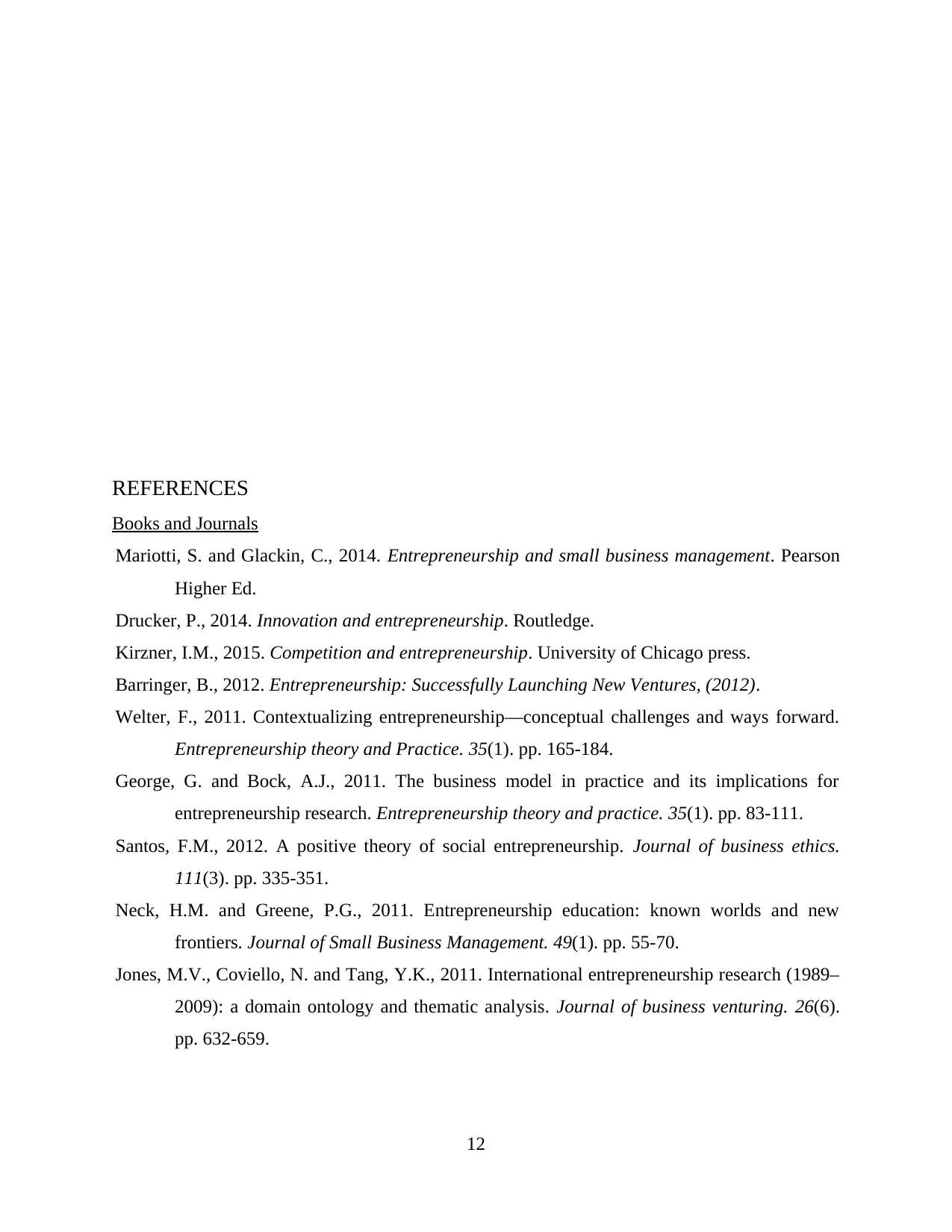
REFERENCES
Books and Journals
Mariotti, S. and Glackin, C., 2014. Entrepreneurship and small business management. Pearson
Higher Ed.
Drucker, P., 2014. Innovation and entrepreneurship. Routledge.
Kirzner, I.M., 2015. Competition and entrepreneurship. University of Chicago press.
Barringer, B., 2012. Entrepreneurship: Successfully Launching New Ventures, (2012).
Welter, F., 2011. Contextualizing entrepreneurship—conceptual challenges and ways forward.
Entrepreneurship theory and Practice. 35(1). pp. 165-184.
George, G. and Bock, A.J., 2011. The business model in practice and its implications for
entrepreneurship research. Entrepreneurship theory and practice. 35(1). pp. 83-111.
Santos, F.M., 2012. A positive theory of social entrepreneurship. Journal of business ethics.
111(3). pp. 335-351.
Neck, H.M. and Greene, P.G., 2011. Entrepreneurship education: known worlds and new
frontiers. Journal of Small Business Management. 49(1). pp. 55-70.
Jones, M.V., Coviello, N. and Tang, Y.K., 2011. International entrepreneurship research (1989–
2009): a domain ontology and thematic analysis. Journal of business venturing. 26(6).
pp. 632-659.
12
Books and Journals
Mariotti, S. and Glackin, C., 2014. Entrepreneurship and small business management. Pearson
Higher Ed.
Drucker, P., 2014. Innovation and entrepreneurship. Routledge.
Kirzner, I.M., 2015. Competition and entrepreneurship. University of Chicago press.
Barringer, B., 2012. Entrepreneurship: Successfully Launching New Ventures, (2012).
Welter, F., 2011. Contextualizing entrepreneurship—conceptual challenges and ways forward.
Entrepreneurship theory and Practice. 35(1). pp. 165-184.
George, G. and Bock, A.J., 2011. The business model in practice and its implications for
entrepreneurship research. Entrepreneurship theory and practice. 35(1). pp. 83-111.
Santos, F.M., 2012. A positive theory of social entrepreneurship. Journal of business ethics.
111(3). pp. 335-351.
Neck, H.M. and Greene, P.G., 2011. Entrepreneurship education: known worlds and new
frontiers. Journal of Small Business Management. 49(1). pp. 55-70.
Jones, M.V., Coviello, N. and Tang, Y.K., 2011. International entrepreneurship research (1989–
2009): a domain ontology and thematic analysis. Journal of business venturing. 26(6).
pp. 632-659.
12
⊘ This is a preview!⊘
Do you want full access?
Subscribe today to unlock all pages.

Trusted by 1+ million students worldwide
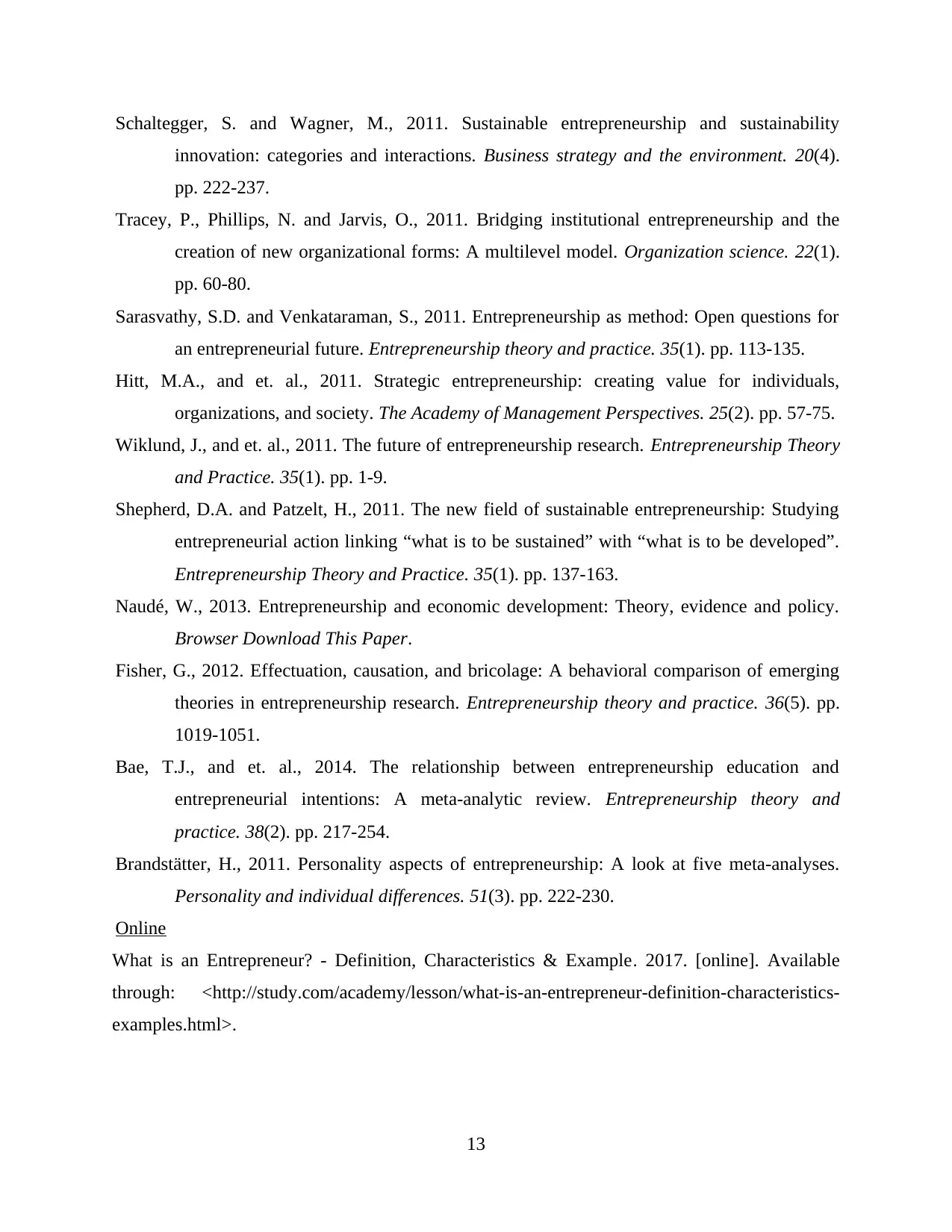
Schaltegger, S. and Wagner, M., 2011. Sustainable entrepreneurship and sustainability
innovation: categories and interactions. Business strategy and the environment. 20(4).
pp. 222-237.
Tracey, P., Phillips, N. and Jarvis, O., 2011. Bridging institutional entrepreneurship and the
creation of new organizational forms: A multilevel model. Organization science. 22(1).
pp. 60-80.
Sarasvathy, S.D. and Venkataraman, S., 2011. Entrepreneurship as method: Open questions for
an entrepreneurial future. Entrepreneurship theory and practice. 35(1). pp. 113-135.
Hitt, M.A., and et. al., 2011. Strategic entrepreneurship: creating value for individuals,
organizations, and society. The Academy of Management Perspectives. 25(2). pp. 57-75.
Wiklund, J., and et. al., 2011. The future of entrepreneurship research. Entrepreneurship Theory
and Practice. 35(1). pp. 1-9.
Shepherd, D.A. and Patzelt, H., 2011. The new field of sustainable entrepreneurship: Studying
entrepreneurial action linking “what is to be sustained” with “what is to be developed”.
Entrepreneurship Theory and Practice. 35(1). pp. 137-163.
Naudé, W., 2013. Entrepreneurship and economic development: Theory, evidence and policy.
Browser Download This Paper.
Fisher, G., 2012. Effectuation, causation, and bricolage: A behavioral comparison of emerging
theories in entrepreneurship research. Entrepreneurship theory and practice. 36(5). pp.
1019-1051.
Bae, T.J., and et. al., 2014. The relationship between entrepreneurship education and
entrepreneurial intentions: A meta‐analytic review. Entrepreneurship theory and
practice. 38(2). pp. 217-254.
Brandstätter, H., 2011. Personality aspects of entrepreneurship: A look at five meta-analyses.
Personality and individual differences. 51(3). pp. 222-230.
Online
What is an Entrepreneur? - Definition, Characteristics & Example. 2017. [online]. Available
through: <http://study.com/academy/lesson/what-is-an-entrepreneur-definition-characteristics-
examples.html>.
13
innovation: categories and interactions. Business strategy and the environment. 20(4).
pp. 222-237.
Tracey, P., Phillips, N. and Jarvis, O., 2011. Bridging institutional entrepreneurship and the
creation of new organizational forms: A multilevel model. Organization science. 22(1).
pp. 60-80.
Sarasvathy, S.D. and Venkataraman, S., 2011. Entrepreneurship as method: Open questions for
an entrepreneurial future. Entrepreneurship theory and practice. 35(1). pp. 113-135.
Hitt, M.A., and et. al., 2011. Strategic entrepreneurship: creating value for individuals,
organizations, and society. The Academy of Management Perspectives. 25(2). pp. 57-75.
Wiklund, J., and et. al., 2011. The future of entrepreneurship research. Entrepreneurship Theory
and Practice. 35(1). pp. 1-9.
Shepherd, D.A. and Patzelt, H., 2011. The new field of sustainable entrepreneurship: Studying
entrepreneurial action linking “what is to be sustained” with “what is to be developed”.
Entrepreneurship Theory and Practice. 35(1). pp. 137-163.
Naudé, W., 2013. Entrepreneurship and economic development: Theory, evidence and policy.
Browser Download This Paper.
Fisher, G., 2012. Effectuation, causation, and bricolage: A behavioral comparison of emerging
theories in entrepreneurship research. Entrepreneurship theory and practice. 36(5). pp.
1019-1051.
Bae, T.J., and et. al., 2014. The relationship between entrepreneurship education and
entrepreneurial intentions: A meta‐analytic review. Entrepreneurship theory and
practice. 38(2). pp. 217-254.
Brandstätter, H., 2011. Personality aspects of entrepreneurship: A look at five meta-analyses.
Personality and individual differences. 51(3). pp. 222-230.
Online
What is an Entrepreneur? - Definition, Characteristics & Example. 2017. [online]. Available
through: <http://study.com/academy/lesson/what-is-an-entrepreneur-definition-characteristics-
examples.html>.
13
1 out of 16
Related Documents
Your All-in-One AI-Powered Toolkit for Academic Success.
+13062052269
info@desklib.com
Available 24*7 on WhatsApp / Email
![[object Object]](/_next/static/media/star-bottom.7253800d.svg)
Unlock your academic potential
© 2024 | Zucol Services PVT LTD | All rights reserved.



![Entrepreneurship and Small Business Impact Report - [University Name]](/_next/image/?url=https%3A%2F%2Fdesklib.com%2Fmedia%2Fimages%2Fwj%2Fd1f42599211847658d3fd556aa563fa5.jpg&w=256&q=75)

